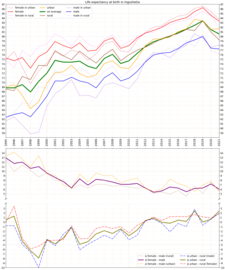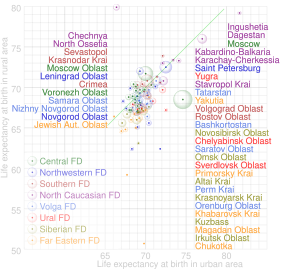Ingushetia
Ingushetia or Ingushetiya,[8][a] officially the Republic of Ingushetia,[b] is a republic of Russia located in the North Caucasus of Eastern Europe. The republic is part of the North Caucasian Federal District, and shares land borders with the country of Georgia to its south; and borders the Russian republics of North Ossetia–Alania to its west and north and Chechnya to its east and northeast.
$_$_$DEEZ_NUTS#0__titleDEEZ_NUTS$_$_$
$_$_$DEEZ_NUTS#0__subtitleDEEZ_NUTS$_$_$
For other uses, see Ingushetia (disambiguation).$_$_$DEEZ_NUTS#2__subtextDEEZ_NUTS$_$_$
Up until the dissolution of the Soviet state, Ingushetia was part of the Chechen-Ingush ASSR of the Russian Soviet Socialist Republic. In the late 1920s – early 1930s the Soviet officials were eager to enforce the Chechen-Ingush merger as an "objective" and "natural" process. The Soviet linguist Nikolay Yakovlev, who was a supporter of the merger, suggested that an inclusive name of "Veinakh" ("our people") had to be used for both the Chechens and Ingush. According to his views, the rapid urbanization and rapprochement of the Chechens and Ingush within one and the same republic might encourage the formation of a common culture and language and the establishment of a unified "Veinakh" people.
During the late '80s, together with the separatist tendencies across the Soviet Union, the Second Congress of the Ingush People was held in Grozny on 9–10 September 1989. The gathering was directed at the top leadership of the Soviet Union, and included a request to "restore the Ingush people's autonomy within their historical borders, the Ingush Autonomous Soviet Socialist Republic with a capital in the right-bank part of the city of Ordzhonikidze". The Ingush Republic was to be organized out of six traditional Ingush districts (including the contested Prigorodny District). The rise of the Russian Federation - and the 1991 Chechen Revolution - gave the Ingushetians the independence they vowed for and in 1992 the remainder of Checheno-Ingushstia became thus the Republic of Ingushtia. During the 1990s, Ingushetia was ruled by its elected president Ruslan Aushev, a former Soviet general and hero of the war in Afghanistan.
The head of government and the highest executive post in Ingushetia is the Head, elected by representatives of the Parliament of Ingushetia.
Recent heads:
Recent Chairmen of the Government:
The parliament of the Republic is the People's Assembly, composed of 34 deputies elected for a four-year term. The People's Assembly is headed by the Chairman. As of 2022, the Chairman of the People's Assembly is Vladimir Slastenin.
The Constitution of Ingushetia was adopted on 27 February 1994.
Ingushetia is a member of the Unrepresented Nations and Peoples Organization.
The capital was moved from Nazran to Magas in December 2002.
The most recent election was held in 2013.
Etymology[edit]
The name Ingushetia (Ингушетия) derives from the Russian name of the Ingush, which in turn is derived from the ancient Ingush village Angusht, and from the Georgian suffix -éti.[16] The name in Ingush is Ghalghaaichie (Гӏалгӏайче).[17]
In the 1920–1930s there was not yet a unifying name for the Ingush Autonomous Oblast. Although the oblast was officially called Ingushetia, some scientists like Nikolai Yakovlev and Leonid Semyonov insisted that its correct name is Ingushiya (Ингушия).[18]
$_$_$DEEZ_NUTS#2__titleDEEZ_NUTS$_$_$
Its capital is the town of Magas, while the largest city is Nazran. At 3,600 square km, in terms of area, the republic is the smallest of Russia's non-city federal subjects. It was established on 4 June 1992, after the Checheno-Ingush Autonomous Soviet Socialist Republic was split in two.[9][10] The republic is home to the indigenous Ingush, a people of Nakh ancestry. As of the 2021 Census, its population was estimated to be 509,541.[4]
Largely due to the insurgency in the North Caucasus, Ingushetia remains one of the poorest and most unstable regions of Russia. Although the violence has died down in recent years,[11][12] the insurgency in neighboring Chechnya had occasionally spilled into Ingushetia. According to Human Rights Watch in 2008, the republic has been destabilized by corruption, a number of high-profile crimes (including kidnapping and murder of civilians by government security forces),[13] anti-government protests, attacks on soldiers and officers, Russian military excesses and a deteriorating human rights situation.[14][15] In spite of this, Ingushetia has the highest life expectancy in all of Russia at 80.52, beating out second-place Dagestan by almost 4 years.
Economy[edit]
There are some natural resources in Ingushetia: mineral water in Achaluki, oil and natural gas in Malgobek, forests in Dzheirakh, metals in Galashki. The local government is considering the development of tourism; however, this is problematic due to the uneasy situation in the republic itself and the proximity of some conflict zones. However, Ingushetia continues to remain as one of Russia's poorest republics, largely due to the ongoing conflict, corruption and civil disorders. Unemployment is estimated to be around 53%, and growing poverty is a major issue.[127]
$_$_$DEEZ_NUTS#3__titleDEEZ_NUTS$_$_$
$_$_$DEEZ_NUTS#3__subtextDEEZ_NUTS$_$_$
$_$_$DEEZ_NUTS#1__titleDEEZ_NUTS$_$_$
Russia
3,628 km2 (1,401 sq mi)
163.16/km2 (422.6/sq mi)
54.8%
45.2%
RU-IN
06




